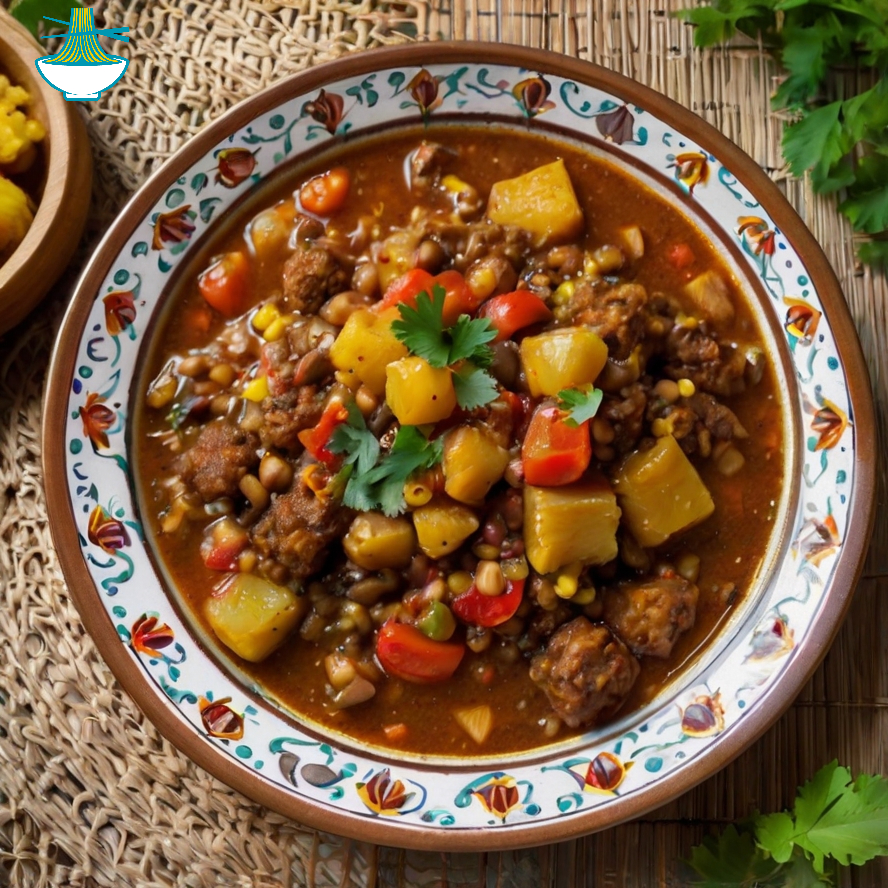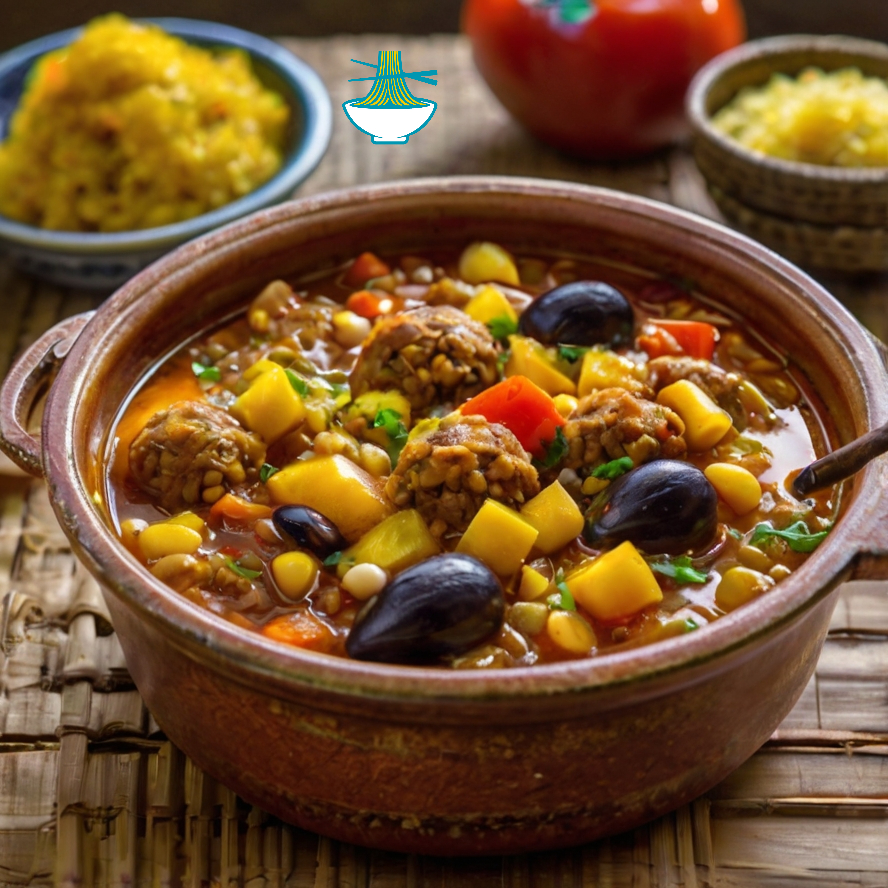Cachupa is a traditional and hearty stew from Cape Verde, known for its rich flavors and cultural significance. This national dish combines corn, beans, vegetables, and meat (or fish) into a savory stew that reflects Cape Verdean culinary traditions. Ideal for special occasions and gatherings, Cachupa offers a taste of Cape Verde’s vibrant heritage.

Cape Verde, discovered by Portuguese explorers in the 15th century, became an important trading post during the transatlantic slave trade. The introduction of corn by Portuguese colonizers influenced local cuisine, leading to the creation of Cachupa. Initially a simple meal of corn and beans, it evolved to include meat, fish, vegetables, and spices, symbolizing unity and community. Declared Cape Verde’s national dish in 2011, Cachupa remains a cherished culinary treasure, highlighting the country’s history and cultural diversity.
Ingredients:
- 2 cups dried corn kernels
- 1 cup dried beans (such as kidney beans or black-eyed peas)
- 1 onion, finely chopped
- 2 cloves garlic, minced
- 2 tomatoes, diced
- 2 bay leaves
- 2 tablespoons vegetable oil
- 1 pound meat (pork, beef, or chicken), cut into bite-sized pieces (optional)
- 1 pound smoked sausage or chorizo, sliced
- 1 large sweet potato, peeled and diced
- 1 large carrot, peeled and diced
- ½ cabbage, shredded
- Salt and pepper to taste
- Water for boiling
Instructions:
1. Prepare the Corn and Beans: In a large pot, combine the dried corn kernels and beans. Cover with water and soak overnight. Drain and rinse the next day.
2. Cook the Corn and Beans: Add fresh water to cover the soaked corn and beans. Bring to a boil, then reduce the heat and simmer for 1-2 hours, or until tender. Stir occasionally and add more water if necessary.
3. Sauté the Aromatics: In a separate pan, heat the vegetable oil over medium heat. Sauté the chopped onion and minced garlic until fragrant and translucent. Add the diced tomatoes and cook until softened.
4. Add Meat and Sausage (Optional): If using meat, add it to the pan with the aromatics and cook until browned. Add the sliced smoked sausage or chorizo and cook until flavorful.
5. Combine the Ingredients: Transfer the cooked corn and beans to the pot with the aromatics, meat, and sausage. Stir and add bay leaves. Pour in enough water to cover the ingredients and bring to a simmer.
6. Add Vegetables: Add the diced sweet potato, carrot, and shredded cabbage. Season with salt and pepper. Simmer for 30-45 minutes, or until the vegetables are tender and the flavors meld.
7. Serve and Enjoy: Remove bay leaves before serving. Enjoy hot, often with bread or rice.
Note: Cachupa is versatile; regional variations may include additional ingredients like pumpkin, yams, or other vegetables. Adjust spiciness with chili peppers or hot sauce if desired.

Nutrition Value:
1. 2 cups dried corn kernels
- Calories: Approximately 680
- Carbohydrates: 160 grams
- Protein: 20 grams
- Fat: 4 grams
- Sodium: 0 mg
- Cholesterol: 0 mg
- Vitamins: High in Vitamin B6, folate, and thiamine
- Minerals: Rich in magnesium, phosphorus, and potassium
- Nutritional Benefit: Provides a good source of energy and supports healthy digestion and heart health.
2. 1 cup dried beans (such as kidney beans or black-eyed peas)
- Calories: Approximately 225
- Carbohydrates: 40 grams
- Protein: 15 grams
- Fat: 0.9 grams
- Sodium: 0 mg
- Cholesterol: 0 mg
- Vitamins: High in folate and Vitamin B6
- Minerals: Rich in iron, magnesium, and potassium
- Nutritional Benefit: Excellent source of protein and fiber, supporting muscle growth and digestive health.
3. 1 onion, finely chopped
- Calories: Approximately 45
- Carbohydrates: 11 grams
- Protein: 1 gram
- Fat: 0.1 grams
- Sodium: 5 mg
- Cholesterol: 0 mg
- Vitamins: Rich in Vitamin C and Vitamin B6
- Minerals: Contains potassium and calcium
- Nutritional Benefit: Provides antioxidants and supports immune function and cardiovascular health.
4. 2 cloves garlic, minced
- Calories: Approximately 9
- Carbohydrates: 2 grams
- Protein: 0.4 grams
- Fat: 0 grams
- Sodium: 1 mg
- Cholesterol: 0 mg
- Vitamins: Contains Vitamin C and Vitamin B6
- Minerals: Provides manganese and calcium
- Nutritional Benefit: Offers antibacterial properties and supports immune function and cardiovascular health.
5. 2 tomatoes, diced
- Calories: Approximately 44
- Carbohydrates: 10 grams
- Protein: 2 grams
- Fat: 0.5 grams
- Sodium: 9 mg
- Cholesterol: 0 mg
- Vitamins: High in Vitamin C and Vitamin A
- Minerals: Rich in potassium and folate
- Nutritional Benefit: Provides antioxidants like lycopene and supports skin health and immune function.
6. 2 bay leaves
- Calories: Approximately 5
- Carbohydrates: 1 gram
- Protein: 0.1 grams
- Fat: 0.2 grams
- Sodium: 0 mg
- Cholesterol: 0 mg
- Vitamins: Contains Vitamin A and Vitamin C
- Minerals: Provides calcium and potassium
- Nutritional Benefit: Adds flavor and may aid in digestion and reduce inflammation.
7. 2 tablespoons vegetable oil
- Calories: Approximately 240
- Carbohydrates: 0 grams
- Protein: 0 grams
- Fat: 28 grams
- Sodium: 0 mg
- Cholesterol: 0 mg
- Vitamins: Contains Vitamin E
- Minerals: None significant
- Nutritional Benefit: Provides essential fatty acids and supports overall health.
8. 1 pound meat (pork, beef, or chicken), cut into bite-sized pieces (optional)
- Calories: Approximately 500
- Carbohydrates: 0 grams
- Protein: 50 grams
- Fat: 30 grams
- Sodium: Varies by meat type
- Cholesterol: Varies by meat type
- Vitamins: Rich in Vitamin B12 and niacin
- Minerals: Contains iron, zinc, and phosphorus
- Nutritional Benefit: Provides high-quality protein and essential nutrients for muscle growth and overall health.
9. 1 pound smoked sausage or chorizo, sliced
- Calories: Approximately 700
- Carbohydrates: 2 grams
- Protein: 24 grams
- Fat: 60 grams
- Sodium: 2,000 mg
- Cholesterol: 80 mg
- Vitamins: Contains some Vitamin B12
- Minerals: High in sodium
- Nutritional Benefit: Adds flavor but should be consumed in moderation due to high sodium and fat content.
10. 1 large sweet potato, peeled and diced
- Calories: Approximately 115
- Carbohydrates: 27 grams
- Protein: 2 grams
- Fat: 0.2 grams
- Sodium: 72 mg
- Cholesterol: 0 mg
- Vitamins: High in Vitamin A and Vitamin C
- Minerals: Rich in potassium and manganese
- Nutritional Benefit: Provides antioxidants and supports vision, immune function, and digestive health.
11. 1 large carrot, peeled and diced
- Calories: Approximately 50
- Carbohydrates: 12 grams
- Protein: 1 gram
- Fat: 0.2 grams
- Sodium: 69 mg
- Cholesterol: 0 mg
- Vitamins: Rich in Vitamin A and Vitamin K
- Minerals: Contains potassium and calcium
- Nutritional Benefit: Supports vision health, immune function, and skin health.
12. ½ cabbage, shredded
- Calories: Approximately 20
- Carbohydrates: 5 grams
- Protein: 1 gram
- Fat: 0.1 grams
- Sodium: 10 mg
- Cholesterol: 0 mg
- Vitamins: High in Vitamin C and Vitamin K
- Minerals: Provides potassium and calcium
- Nutritional Benefit: Supports digestive health, immune function, and may help reduce inflammation.
13. Salt and pepper to taste
- Salt: Varies depending on amount used; primarily adds sodium.
- Pepper: Minimal calories; provides some antioxidants and may aid digestion.
14. Water for boiling
- Calories: 0
- Carbohydrates: 0 grams
- Protein: 0 grams
- Fat: 0 grams
- Sodium: 0 mg
- Cholesterol: 0 mg
- Vitamins: None
- Minerals: None
- Nutritional Benefit: Essential for cooking and hydration, but no significant nutrients.
Feel free to adjust ingredient quantities and specifics based on your recipe variations!


Comments